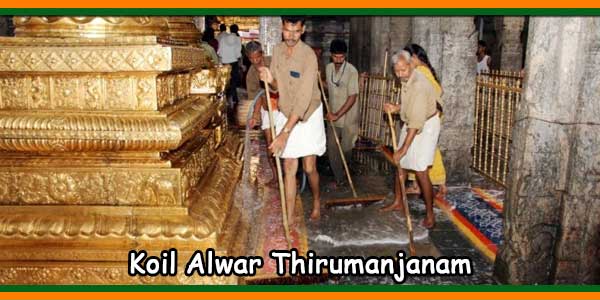Koil Alwar means ‘Holy Shrine’. Alwar means “Devotee”. Tirumanjanam means “Cleaning with aromatic ingredients”.
Koil Tirumanjanam is a purification ceremony of sanctum santorum and temple premises by devotees. During the ceremony, all the deities and other articles are removed from sanctum santorum and cleansed while the “Mula Virat” is covered with a waterproof covering.
The entire Garbha Griham, including floors, ceilings and walls, sub-shrines inside the sanctum, puja articles are cleaned with water and Tirumanjanam which is a composition of camphor, sandal paste, saffron, turmeric Kicchili Gadda (a root vegetable) etc. is smeared, which acts as a disinfectant.
The covering of the main deity is then removed and the deities, Deepam and other articles are replaced inside. Special pujas and Naivedyams are then offered to the presiding deity.
This ceremony is performed strictly as per the agamas and is conducted four times year viz. before Ugadi, Anivara Asthanam, Vaikunta Ekadasi and Annual Brahmotsavams.
The Koil Alwar Tirumanjanam ceremony takes place in the morning, Tirumanjanam is performed 4 times in a year. The Koil Alwar Tirumanjanam is condected on Ugadi, Anivara Asthanam, Vaikunta Ekadasi and Brahmotsavam.
This ceremony is performed according to Vaikasana Agamas and the main deity is covered with waterproof cloths to avoid water, dust and wind. The temple will be closed for 5 to 6 hours during Tirumanjanam. The temple will be opened at 12:00 Noon after the Tirumanjanam.
The entire Garbalayam including ceiling, walls, floors, pillars is cleaned and brushed with water. Aarti plates, Deepam Vessels and other utensils are also cleaned.
